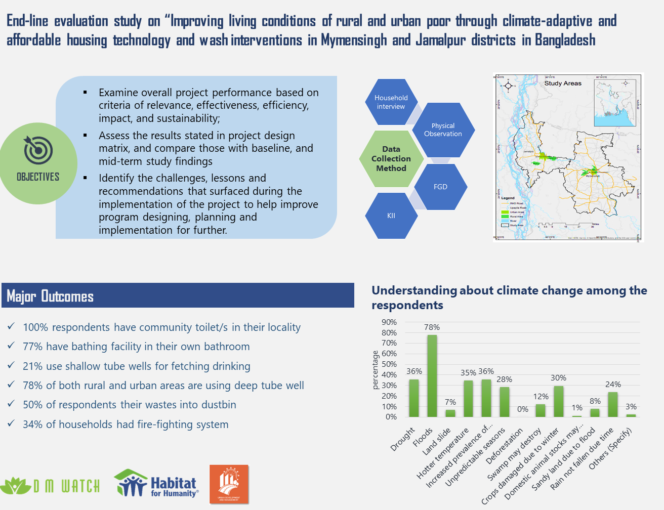

End term Evaluation of “Improving Living Conditions of Rural and Urban Poor through Climate-Adaptive and Affordable Housing Technologies and WaSH Interventions in Mymensingh and Jamalpur Districts in Bangladesh”

DM WATCH team conducted this evaluation study during the month of October to December 2020. The overall objective of this End-line Evaluation study was to understand the impact generated by the project especially at the project participant’s households and community level. Both quantitative and qualitative methods were used for preparing the end line study. Investigative tools including Household Interview, Focus Group Discussion (FGD) and Key Informant Interview (KII) and physical observation were used. A total of 240 quantitative household surveys with 240 physical observations, 28 KIIs and 14 FGDs were conducted. This investigation revealed that 54.6% of the houses had corrugated iron (CI) sheet shade and wall; almost every renovated/constructed house experienced better resilience during monsoon season and against other environmental hazards. 34% of households had a fire-fighting system installed or precaution measures taken; 89% of the respondents from all clusters confirmed that they had separate chambers for women, and they were content with the facility. About 21% of the respondents used shallow tube wells for fetching drinking water whereas 78% respondent of both rural and urban areas stated that they were using deep tube wells for drinking water so, there had been significant improvement in the quality of drinking water. This end line evaluation suggested that 88.33% of the respondents have participated in WASH programmes. Almost 28% of the total participants had learned knowledge about WASH whereas the training increased awareness level of another 64.50% of the participants. It was recommended that there were rooms for further development – however, HFHB alone could not achieve these developments by itself. Consorted efforts, awareness of the relevant stakeholders at the giving end could have paved the path for long term development.
© 2023 DM WATCH LIMITED. All Rights Reserved
